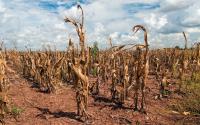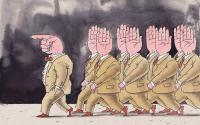28 August 2007International Herald Tribune
More than one million pilgrims were ordered to leave the Shiite holy city of Karbala on Tuesday as the police imposed a curfew after two days of violence that included raging gun battles between what appeared to be rival Shiite militias.
At least 35 people have been killed during a religious festival there, with nearly 200 wounded, security officials said. The government sent reinforcements from Baghdad to quell growing unrest and help clear Karbala.
Security officials said gunmen from the Mahdi militia, which is nominally loyal to the Shiite cleric Moktada al-Sadr, had attacked guards around the two Karbala shrines that were under the protection of the Badr Brigade, the armed wing of the Supreme Islamic Iraqi Council, a major Shiite party.
In telephone calls to reporters in Karbala, gunfire and exploding mortar shells could be heard.
The security officials, who requested anonymity for security reasons, said at least 180 people had been wounded, including women and children.
A spokesman for the Interior Ministry, Major General Abdul-Karim Khalaf, said "entrances and exits to Karbala have been secured and more forces are on the way from other provinces," including Baghdad. The other officials said buses had been dispatched to Karbala to take pilgrims out of the city.
Gunshots rang out Tuesday in the area near the Shiite shrines that are the focal point of celebrations marking the birthday of the 12th and last Shiite imam, who disappeared in the ninth century. The festival reaches its high point Tuesday night and Wednesday morning.
Thirty of the dead were killed in fighting on Tuesday; five others died in an outbreak of violence Monday night when pilgrims tried to push past frustratingly slow security checkpoints near the Imam al-Hussein Mosque.
A member of the City Council said the center of town was in chaos, with pilgrims running in all directions to escape the gunfire. No one, he said, was sure who was doing the shooting. He said a rocket-propelled grenade had exploded near the Hussein Mosque.
"We don't know what's going on," said the councilman, who would not allow use of his name for security reasons. "All we know is the huge numbers of pilgrims was too much for the checkpoints to handle and now there is shooting."
Town gets its water back
Hundreds of U.S. and Iraqi troops backed by helicopters and jet fighters killed 33 Sunni insurgents who were holding back the water supply to a Shiite town north of Baghdad, The AP reported, citing a statement Tuesday from the U.S. command.
The assault began before dawn on Monday when a joint force was landed by helicopter in the village of Gubbiya, just east of the Shiite town, Khalis, in Diyala Province. The assault force killed 13 fighters, and attack aircraft killed 20 others, the military said.
Khalis has been the scene of repeated Sunni insurgent bombings and mortar attacks. The military said the surrounding area is controlled by Al Qaeda in Mesopotamia.
"The objective of the mission was to open the spillway, which regulates water flow to the town of Khalis, restoring the essential service of water," the statement said.
The assault uncovered three weapons caches and led to the capture of three men, the military said.
"Water is currently flowing unimpeded to Khalis," the military's statement said, without specifying whether any U.S. or Iraqi soldiers had been killed or wounded.
Iranian offers to help Iraq
President Mahmoud Ahmadinejad of Iran said Tuesday that Iran was ready to help fill an imminent power vacuum in Iraq, while also defending the Iraq prime minister, Nuri Kamal al-Maliki, who has been criticized by U.S. politicians, The AP reported from Tehran.
"The political power of the occupiers is collapsing rapidly," Ahmadinejad said at a news conference, referring to the U.S.-led coalition. "Soon, we will see a huge power vacuum in the region. Of course, we are prepared to fill the gap, with the help of neighbors and regional friends like Saudi Arabia, and with the help of the Iraqi nation."
Ahmadinejad did not elaborate how Iran would fill an eventual power gap in Iraq, but his remarks reflected what may be perceived as Iran's eagerness to have an increasing influence on Iraq's political scene.
His mentioning a Saudi role may have sought to allay regional fears that Ahmadinejad would want to dominate in Iraq. Even though Riyadh and Tehran have not cooperated in the past, it "doesn't mean it can't happen," Ahmadinejad said.
Ahmadinejad accused the United States of interfering in Iraq's internal affairs and said any U.S. effort to topple Maliki's government would fail. He dismissed the possibility of any U.S. military action against Tehran, saying Washington had no plan and was not in a position to take such action.






